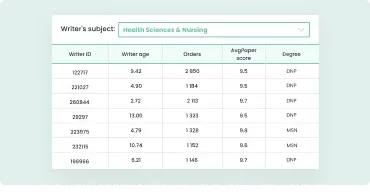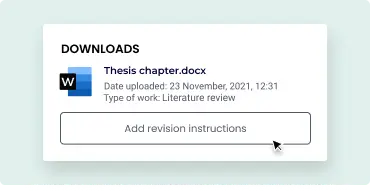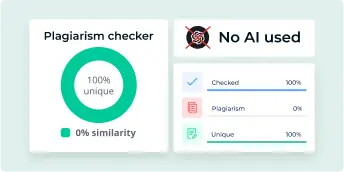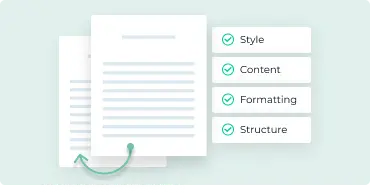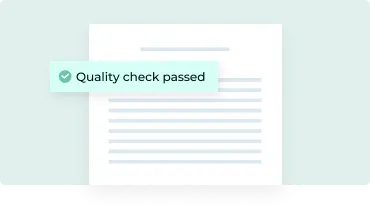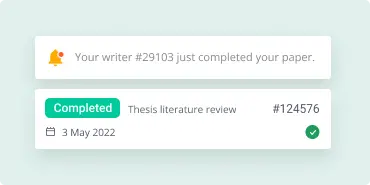Take the stress out of writing a reaction paper with expert support
Learn how to write a reaction paper from our best experts and finally get the grade you deserve!
Benefits you get from delegating your reaction paper to us
Let a tried-and-true service write reaction paper for you
Our writing assistance ensures utmost security – we have implemented advanced measures to guarantee your safety when you buy reaction papers from us.
-
 Protection of intellectual property
Protection of intellectual propertyYour paper is your exclusive property. We never resell, reproduce, or share written materials from our database.

-
 Commitment to confidentiality
Commitment to confidentialityOur writing service strictly adheres to confidentiality standards outlined in our privacy policy, ensuring CCPA & GDPR compliance & SSL encryption.

-
 Safe transactions
Safe transactionsPay for our help with a reaction paper securely using widely accepted credit/debit cards. We partner with trusted gateways to safeguard your data.

We can lend a hand at any stage of writing a reaction paper
What customers say about our help writing reaction paper
How to Write a Reaction Paper: Top Tips & Insights
If you’re tasked to write a reaction paper for the first time, this assignment may be challenging. But don’t worry! Learning how to craft a paper of this type is an engaging process that can significantly benefit your academic performance. Successfully completing this assignment can help enhance both your academic performance and reputation within the school.
In this article, we’ll discuss what is a reaction paper & its features and consider sections to include. Moreover, our thesis writing service experts also prepare some effective tips for creating a well-written copy. Ensure they are true professionals, and feel free to ask them for help anytime needed.
What Is a Reaction Paper: Definition & Features
A reaction paper is an academic writing task that involves a thoughtful and subjective reaction to a specific text, idea, event, or topic. Its purpose is to express one’s thoughts, opinions, or viewpoints regarding a particular subject matter.
Reaction papers are a common writing assignment in various disciplines, including literature, philosophy, sociology, psychology, and many more. They provide an opportunity for students to engage critically with course material, develop their analytical skills, and articulate their own perspectives.
Some key features of a reaction paper include the following:
- Active engagement with a particular text, whether it’s a literary work, an article, a film, a lecture, a work of art, or any other form of content.
- Subjectivity in expressing one’s opinions, feelings, and interpretations.
- Critical analysis of the text or topic, discussing its components and exploring underlying meanings or themes.
- Reflection, where you consider how the material relates to your own experiences, beliefs, or values.
- Thesis or main argument that expresses the main point or perspective you want to convey in your response.

Reaction Paper Format: 5 Essential Parts
While there is no strict, universal format for reaction paper, this type of writing typically consists of five key sections.
Introduction
Your introduction is the first thing your instructor will see when reading your paper, so make sure it’s clear and attention-grabbing. Briefly introduce the topic or idea you’re planning to discuss. Mention the original work and its creator, including when it was published or released.
Summarize the key elements, share your initial reaction, and highlight important aspects of your work. Keep the introduction concise to maintain the reader’s interest and avoid repetition.
While you don’t need to delve deeply into specific paper elements, providing a brief summary is an absolute must.
Summary
According to a general reaction paper format, the summary always comes second after the introduction. In your summary, be informative and condense the content of the work being reacted upon to the main ideas. This part of your paper should include:
- A concise sum-up of the key points or arguments presented in the material.
- Specific details and examples that are essential to understanding your analysis.
- Focus on the most important aspects without diving deep into details.
Analysis
The analysis part is where you:
- Discuss the material in-depth, considering its strengths, weaknesses, and overall effectiveness.
- Use evidence from the text or content to support your analysis.
- Explore underlying themes, the author’s intentions, and any literary or rhetorical devices used.
- Discuss your own reactions, thoughts, and feelings in reaction to the material.
Reflection
In this section of a reaction paper, your instructor will generally expect you to reflect on how the material relates to your own experiences, beliefs, or values. Here are a few hints to make your reflection truly effective:
- Consider any personal connections or insights that arose during your engagement with the content.
- Discuss the impact the material had on your understanding or perspective.
Conclusion
The conclusion is the last part of your paper, where you sum up the main points of your reaction and restate your thesis or main argument. Make sure to offer any final reflections or considerations and end with a strong closing statement to leave a lasting impression.
A good idea is to ask a question at the end to make the reader think or thank them for reading your work.
Top Tips to Write a Reaction Paper That Stands Out
When it comes to writing a reaction paper, there are specific tips you can follow to end up with a flawless copy. These tips are as follows:
- Choose a topic that aligns with the assigned work.
- Identify and note down the key themes you would like to discuss in your paper. This will help you remain on the topic during the entire writing process.
- Maintain a formal academic tone throughout the paper. Avoid drifting into idiomatic or informal language.
- Discuss personal opinions in the first person to add a personal touch to your writing.
- Ensure each paragraph has a topic sentence, a body, and a concluding sentence.
- Proofread your work before submitting it to make sure it contains no mistakes, plagiarism, or inconsistencies that can spoil the grade for the task.
- Support your points with examples for greater impact.
- Add quotations from the original work into your reaction.
- Make sure that the style and format of your writing comply with the specific style guide or referencing style requested by your academic institution.
Lastly, ensure your writing is well-organized. The introduction comes first, followed by the summary, the analysis, the reaction, and then the conclusion. Don’t add any new information in your conclusion to keep the introduction complete and to the point.
If you’re still wondering how to start a reaction paper or unsure of what comprises an outstanding reaction paper, consult with a professional academic paper writing service like thesiswritingservice.com. Our certified, hand-selected reaction paper writers are available to assist you 24/7!
Here’s what our experts can do for you:
- Help select a compelling topic relevant to the task.
- Do research and tailor a flawless copy to your needs.
- Make a reaction paper based on your draft or research.
- Check for mistakes and polish the work you wrote.
- Paraphrase plagiarized parts of your draft to make it original.
- Format your reaction paper in the requested style.
And this is just a short list of the experts’ opportunities we can support with our quality guarantees. Place your order now and get some rest while the experienced topic-relevant specialist takes care of your paper!


